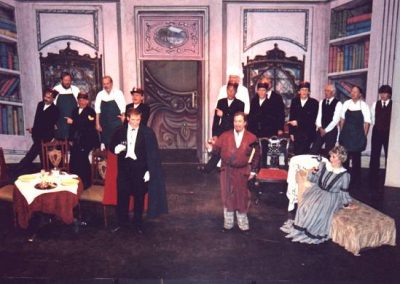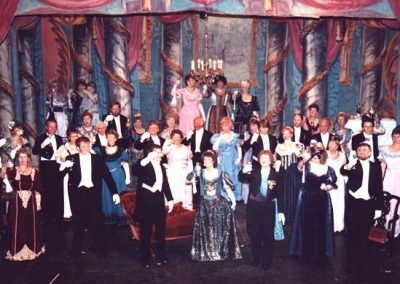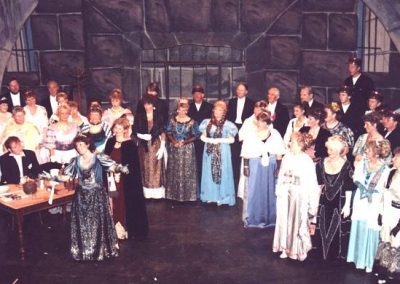Die Fledermaus
Mon 16 to Sat 21 October 1989
Palace Theatre, Redditch
Director – J Barrymore Lee
Musical Director – Norma Kift
Speciality Choreography – Lesley Stocker

Cast List
| Character | Performed by |
|---|---|
| Rosalinda Eisenstein | Sally Ann Davis |
| Gabriel Eisenstein | Michael Faulkner |
| Adele | Barbara Hall |
| Doctor Falke | Kevin Hirons |
| Alfredo | J Barrymore Lee |
| Frank | Tony Jay |
| Prince Orlofsky | Brenda Cooper |
| Ida | Karen Wilson |
| Doctor Blint | Steve Skinner |
| Frosch | Bob Taylor |
| Mitzi | Jean Chalk |
| Ivan | Tony Carr |
| Footman | Arthur Avery |
Reviews
Pleasing voices capture the fun
A large company displays strength in depth in a production which sets commendably about the task of stressing the fun in this familiar work.
The principal’s line-up is full of pleasing voices. The happy central pairing of Sally Ann Davis and Michael Faulkner is strongly supported by J Barrymore Lee (Alfredo), Kevin Hirons (Falke), and Barbara Hall, who is a sparkling minx as Adele.
J Barrymore Lee’s production has intermittent problems with the theatre’s bad sight lines. Bob Taylor’s delightful drunken cameo as Frosch does not escape this problem, which is a pity.
Evening Mail, October 1989
A very enjoyable evening
In October I spent a very enjoyable evening in the Palace Theatre, Redditch where the Redditch Operatic Society were presenting Die Fledermaus.
A well produced and musically directed show. Perhaps a little lacking in pace at times, but the singing of the principals and the chorus well made up for that.
As usual with this show it over-ran slightly and I feel it would have benefited from some judicial cutting in places. However the portrayals of Eisenstein, Adele, Rosalinda, Alfredo and Falke were most convincing.
NODA News, Midland Area, Spring 1990
Our View
Our 30th Anniversary Year production, Die Fledermaus began with a shaky start when we lost the services of our first producers. Nevertheless, once Barrymore Lee had joined us both as director and to play the part of Alfredo, things looked up.
This production also marked the debut as Musical Director by Norma Kift, who had previously been the Society’s accompanist for many years. Norma has remained our Musical Director ever since, and is a life member of the Society.
Since it was a special year, we took the unusual step of letting the company vote for the show they most wanted to perform. One evening at rehearsals for our previous production, we presented a synopsis and played a selection of songs from four shows that seemed the most popular to the company. Then, the whole Society voted for their favourite out of the four. Die Fledermaus, won hands down.
We had very good audience numbers for the week, and the company enjoyed the opportunity to do some ‘proper’ singing in an operetta rather than a musical play.
Synopsis of the Show
Main Songs
- Life Is A Song
- What A Night
- How Sad We Are
- Here’s To Love
- Chacun A Son Gout
- The Laughing Song
- Homeland
- The Tick-Tock Polka
- Brother Mine
The Story
When Gabriel Eisenstein (a likeable gentleman of independent means, but an incorrigible philanderer) pushes his friend Dr Falke into a fountain on their way home from a fancy dress ball, Dr Falke (dressed as a bat) is determined to one day get his own back. This is the story of the ‘Bat’s Revenge’…
Act I – The Eisenstein House
Whilst Gabriel is in court being sentenced to eight days in jail for prodding a policeman with his walking stick, his wife, Rosalinda, is being serenaded by Alfredo, an old flame, who only promises to leave if she allows him to return once Gabriel is locked up. The court allows Gabriel an hour to return home and bid farewell to his wife, and they both pretend devastation that they are to be parted, watched over in amusement by Adele, the house maid. Before Gabriel leaves, Dr Falke arrives and persuades him to attend a party that evening instead of going to prison. Gabriel decides to go dressed as a French Marquis so he will not be recognised. Adele also gets an invitation to the party from her sister Ida, and under Dr Falke’s instigation is to pretend to be a famous actress. Once Gabriel has gone, Alfredo reappears and is just about to take Rosalinda in his arms when Frank the Prison Governor suddenly arrives in order to escort Gabriel away. To save Rosalinda’s reputation, Alfredo pretends to be her husband and is thus taken away to be locked up.
Act II – The Party at Prince Orlofsky’s Villa
Prince Orlofsky, a Russian millionaire, enjoys throwing lavish parties but professes that he has forgotten how to laugh. Dr Falke promises to relive his boredom with an amusing comedy. In turn, the players in the game arrive – Adele (pretending to be Olga, of the dramatic academy), Gabriel (as the ‘Marquis de Renard’) and Frank (who has been persuaded by Dr Falke to assume the guise of a French Chevalier). Much flirtation ensures between Ida and Frank, Adele and Gabriel, and is only interrupted by the arrival of a mysterious masked countess. Gabriel, who cannot resist a challenge, is immediately attracted to this stranger and turns his charms in her direction. Unfortunately for him, she is none other than his wife, Rosalinda. During the flirtation that ensues Gabriel tries in vain to get the lady to unmask, but to no avail. Rosalinda, whilst playing along with him, is furious as she discovers her husband’s true character. Finally, as the clock strikes six in the morning, Frank and Gabriel, now firm friends (and still not knowing each other’s true identity), suddenly remember that they must be elsewhere, and stagger drunkenly off to jail by two different routes.
Act III – The City Jail
In a sorry state, Frank arrives back at the prison. Soon Adele arrives to confess her deception and to persuade Frank to make her his protege. Next comes Gabriel to give himself up, and mutual recognition brings out the full facts of the night before. It also becomes obvious that Alfredo has been mistakenly arrested. On finding out that Alfredo and Rosalinda were together, it is now Gabriel’s turn to play the outraged husband, and threatens Rosalinda with divorce, until she proves that is was she with whom he was flirting the night before. Finally, Dr Falke and Orlofsky arrive to sort out the mess. Adele persuades Frank to suspend the prison sentence, and then chooses to become the protege of Prince Orlofsky. The scene concludes with everybody full of forgiveness and singing the praises of his majesty – King Champagne.
Credits
Music by Johann Strauss.
Music adapted and arranged by Ronald Hanmer.
Book and Lyrics by Phil Park.
By arrangement with Josef Weinberger Ltd.


